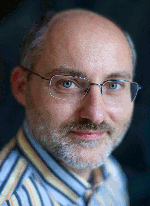Roberto Di Cosmo - What would you do with billions of source code files? News from Software Heritage
- Keynote Speech
- Campus - UFR IM2AG - Amphi F018

Le keynote n'aura pas lieu dans l'amphi habituel.
WARNING - new location :
This keynote will exceptionally be held at UFR IM2AG (Building "F") - Amphitheater F018
After obtaining a PhD in Computer Science at the University of Pisa, Roberto Di Cosmo was associate professor for almost a decade at Ecole Normale Supérieure in Paris, and became a Computer Science full professor at University Paris Diderot in 1999. He is currently on leave at Inria.
He has been actively involved in research in theoretical computing, specifically in functional programming, parallel and distributed programming, the semantics of programming languages, type systems, rewriting and linear logic. His main focus is now on the new scientific problems posed by the general adoption of Free Software, with a particular focus on static analysis of large software collections, that were at the core of the european reseach project Mancoosi.
Following the evolution of our society under the impact of IT with great interest, he is a long term Free Software advocate, contributing to its adoption since 1998 with the best-seller Hijacking the world, seminars, articles and software. He created the Free Software thematic group of Systematic in October 2007, and since 2010 he is director of IRILL, a research structure dedicated to Free and Open Source Software quality.
In 2016, he co-founded and directs Software Heritage, an initiative to build the universal archive of all the source code publicly available.
[The talk will be given in English]
Software is at the heart of our digital society and embodies a growing part of our scientific, technical and organisational knowledge, to the point that we can say it is now part of our cultural heritage. The Software Heritage project's stated mission is to ensure that this precious body of knowledge will be preserved over time and made available to all.
We do this for multiple reasons. To preserve the scientific and technological knowledge embedded in software source code, that is a precious part of our heritage. To allow better software development and reuse for society and industry, by building the largest and open software knowledge database, enabling the development of a broad range of value added applications. To foster better science, by assembling the largest curated archive for software research, and building the infrastructure for preserving and sharing research software.
The size of this archive is daunting: we have already archived more than 3 billion unique source code files and 700 million unique commits, spanning more than 60 million projects from major software development hubs, GNU/Linux distributions, and upstream software collections.
We will explain the mission of Software Heritage and highlight some of the new challenges, both organisational and scientific, that Software Heritage brings up.




